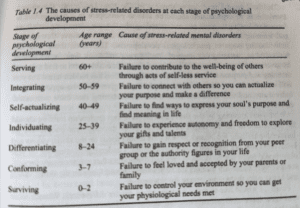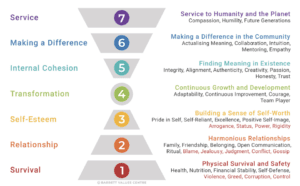 As part of an upcoming PD experience, I am reading this book by Richard Barrett, and thought I would share some of the learnings. The subtitle of this book is “Cultural Health and Employee Well-Being as a Pathway to Sustainable Performance”. This alone makes this book compelling, as a resource to offer some answers / ideas / insights into one of the most compelling and complex issues in education.
As part of an upcoming PD experience, I am reading this book by Richard Barrett, and thought I would share some of the learnings. The subtitle of this book is “Cultural Health and Employee Well-Being as a Pathway to Sustainable Performance”. This alone makes this book compelling, as a resource to offer some answers / ideas / insights into one of the most compelling and complex issues in education.
You would be interested in reading this book if you:
(1) are interested in psychological development theories and values development theories and how they interact
(2) needed something to prompt you to reflect on your own leadership style and development
(3) are looking for a way to self-assess your own leadership development
(4) are exploring your workplace culture and your own influence on that culture
Values and Development:
Values are defined as the energetic drivers of our aspirations and intentions – they are a short-hand for what is important to us values transcend context to be universal. The author explains, which I won’t go into too much detail on here, the connection between development theories of Maslow, Kholberg and others to explain the interplay between needs, desires and ambitions / aspirations.
Whereas Behaviours are the outward manifestations of values, and are context-based. The significant importance that we place on values changes over time:
“Whatever you think you need in a particular moment in time, or is what you value”
A need is ‘ a real or image lack of something that is essential for maintaining the body’s physiological stability or the ego’s emotional stability
Desire is not a need, because a need is a deficit, whereas a desire is a longing for something, an aspiration. Maslow would describe these a Growth needs, and it is the actions taken to meet those goals that provide you with a deeper meaning of who you are: your meaningful purpose and your meaningful purpose.
As humans progress through developmental stages, their values, needs and desires change. One’s ability to master these stages has implications on their ability to lead and thus form healthy cultures within their organizations.
This books is about how to recognise and take steps to actualizing a higher plane of leadership through a values-development lens.
Entropy:
This was a really interesting and useful part of the book, in that the author sets up the understanding of entropy as a challenge or block to achieving a higher plane of leadership. Recognizing one’s own entropy is critical in unblocking the organization to become one that is sustainable and energetic.
Cultural Entropy is the amount of energy people in an organization spend on doing unnecessary or trivial work; something that we can all point to as no organization is immune. Stated in a different way, it is the amount of dysfunction in an organization or any human group structure that is generated by the self-serving, fear-based actions of the leadership of the organization. (Barrett, Pg. 18)
As a leader, we can all carry around entropy, and this originates from our value-development stages. Leadership Entropy is the amount of fear-driven energy that an individual expresses in his or her day-to-day interactions with other people
(Barrett, Pg. 18).
One of the markers of excellent leadership is the inspiration from the leadership to inspire discretionary effort / energy. This is when workers who feel their physiological and psychological growth needs are being met, give more (above and beyond) to their work, to their relationships and ultimately to the value of the organization.
Schools are interesting places because we ask our faculty and staff for discretionary effort all the time – going above and beyond. Since school closures due to Covid-19, many schools are facing a decrease in the willingness for faculty to provide this discretionary effort, and this is not for any fault of their own; rather, this can be reflected as a shift in values, and an increase in cultural entropy.
effort all the time – going above and beyond. Since school closures due to Covid-19, many schools are facing a decrease in the willingness for faculty to provide this discretionary effort, and this is not for any fault of their own; rather, this can be reflected as a shift in values, and an increase in cultural entropy.
The Role of Feedback
Personal Entropy is a blocker to excellent leadership and building a sustainable culture for all. At the heart of unblocking personal entropy is to develop an awareness of one’s emotions. To do this, and I think what the the thrust of this book is about, is the significant importance of, leaders seeking feedback from others who matter.
We may / do have blindspots where our actions and values do not match; where our vision of the organization and the way we lead it do not match. This book offers interesting insights into how to bridge these gaps.
…There has been a considerable amount of interest in helping leaders understand the role that emotions play in their lives and the impact they have on their performance. (Barrett, pg. 140)
Using feedback to gain self-awareness, and self-management of one’s emotions and feelings, and how they manifest in one’s leadership, is critical to be agile enough, and adaptive enough to meet your own needs (of physiological, psychological, relationship and meaningful purpose). (Barrett, Pg. 140)
In other words, leaders must have an excellent EQ for themselves. They must also have excellent social intelligence: the ability to understand and use the emotions of others to guide themselves in making decisions. (Barrett, Pg. 140)
Therefore, it is critical that leaders build their social awareness and relationship management skills, in order to understand and respond to the emotions of others, and to inspire, influence and develop others.
It is undeniable that these 4 skills of self- and social- awareness and management are more important than ever to truly lead a culture of belonging, excellence and in a sustainable way.
I would recommend this book for any leader looking to take a more psychological and systematic approach to their leadership, through the lens of values. I would also recommend this book for anyone looking for feedback instruments on their leadership / professional journey. The author provides many different tests and assessments that I found intriguing.

